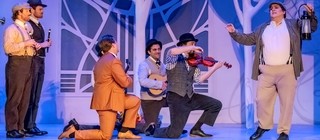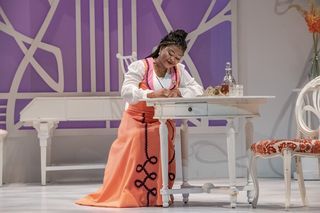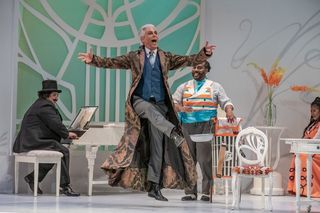|
Back
The Buffoonery of Saratoga New York
Schenectady (Proctors MainStage Theatre)
07/08/2022 - & July 10*, 2022
Gioachino Rossini: Il barbiere di Siviglia
Sidney Outlaw (Figaro), Brian Yeakley (Count Almaviva), Siphokazi Molteno (Rossina), Daniel Mobbs (Doctor Bartolo), Jeremy Harr (Basilio), Whitney Robinson (Berta)
Opera Saratoga Orchestra and Men’s Chorus, Dean Williamson (Conductor)
Eve Summer (Director and Choreographer), Ken MacDonald (Scenic Designer), Dana Osborne (Costume Designer), Benjamin Pilat (Lighting Designer), Sue Schafer (Wigs and Makeup Designer)

B. Yeakley and company (© David Gold)
“The point is...a person feels good listening to Rossini. All you feel like listening to Beethoven is going out and invading Poland.”
Thomas Pynchon, Gravity’s Rainbow
“Delight must be the basis and aim of my art. Simple melody–clear rhythm.”
Gioachino Rossini
Was it Saint Paul or Friedrich Hegel whose conception of heaven was “Listening to Rossini’s Barber of Seville as if for the first time forever and ever for all eternity”? Neither, of course. But listening to the fine not over-the-top production for the Saratoga Opera on Sunday made one feel that this, the finest comic-opera in the operatic repertory was heaven-sent.
The overture is delightful enough. But from the very first “Piano pianissimo” soon blaring out into a chaotic fortissimo, one is situated into a world of wondrous humor, vocal trapeze acts, and the ensembles, Rossini-crescendos (he invented them!) and dramatic climaxes which go on endlessly–and which are never long enough.
In fact, seeing this Saratoga Opera performances in the grandiose retro-sculpted Procter’s Theater in Schenecdady, one wonders why those minor figures like Verdi, Puccini, Mozart and Berg ever needed to write operas at all.
Okay, an exaggeration. Still, this glory of this production was that it let the music do the talking. Conductor Dean Williamson had an orchestra which never thrilled–though the woodwind solos were splendid–and that was fine. For this knew their place down in the pit. Not once, not even in those contrapuntally magical climaxes, did the music overcome the voices.
The sets depended on a few cupola-like constructions turned around so could see Rosina’s window or the balcony or it simply backed up for ensemble playing.
The great coloratura arias came in the second act. For the beginning was played for pure laughter. Little was noble about Brian Yeakley as the Count. He is short, portly and almost a slapstick foil for Siphokazi Molteno. In fact, his romantic opening “Ecco ridente in cielo” had more humor in the phrasing than ardor. Only in his one coloratura aria “Cessa di più resistere” did one hear a commanding tenor. And his costumes as drunken soldier or silly piano teacher was more memorable than the voice.

S. Molteno (© David Gold)
Then again, Ms. Molteno’s Rosina sinewy mezzo-soprano was a comfortable contrast. This was not a powerful Rosina, but it had a captivating appeal. Her “Una voce poco fa” was witty in a quiet way, was her acting.
But now we come leave the lovers for the genius of Figaro, Bartolo and even even Berta.

B. Yeakley, D. Mobbs, S. Outlaw (© David Gold)
Only Rossini could take one of the greatest patter songs of his career and place it at the beginning with Sidney Outlaw’s Figaro. For the rest, Mr. Outlaw pranced through the opera like a never-ending deus ex machina, showing up in every scene wherever he’s needed.
The most perfect baritone was Daniel Mobbs. He looked slimy (like a Republican senator), he could grow excited in his own patter song and a ringing voice. Tying for sliminess was Jeremy Harr’s Don Basilio.
And the most surprising aria of all came from Whitney Robinson as Berta, the washerwoman spinster. Her solo is labeled in 18th Century opera as the aria di sorbetto–the time when audiences go out for a sherbert. Ms Robinson sung “Il vecchiotto cerca moglie” with an opulence and grandeur, giving way to the climaxes.
And these were so grand they elevated Rossini from comic-opera master to Grand Opera ruler. Director Eve Summer had to contend with a dozen-odd characters in the first act. In my piano score that takes up 80 pages. But these were not perfectly tuned Mozart climaxes. We had here soldiers, bandsmen, the doctor, the teacher, the lovers and–of course–Figaro. With such clean direction, such clarity of singing.
Ditto the second act climax. Not quite as grand, but always delightful.
One could say that the Opera Saratoga 2022 Summer Festival took the easy way out with Barber. But easiness is not flabbiness. This a taut comedy, eschewing subtlety yet parading musical and, yes, dramatic genius. There were few children in the audience of this matinee performance. Yet that didn’t matter. Rossini brought out the imagination, the fantasy and the stylized anarchy in us all. And that is celebration enough.
Harry Rolnick
|